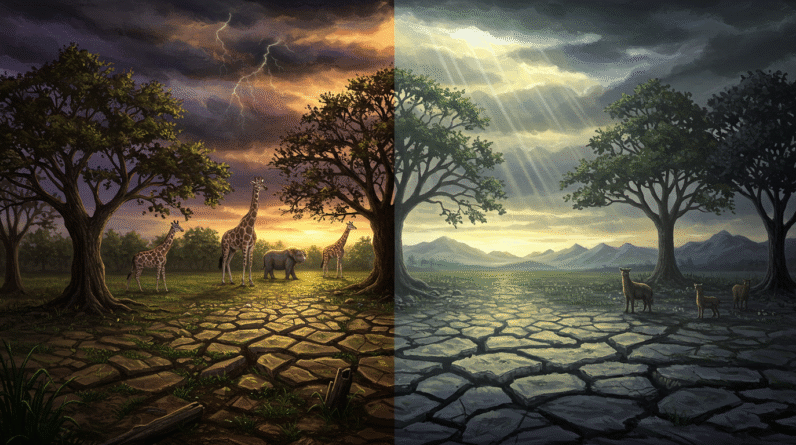God’s Sovereignty Over Creation (Psalm 115:3)
When you read Psalm 115:3, you meet a statement that steadies the heart: “Our God is in heaven; he does whatever pleases him.” You can find that verse here: Psalm 115:3. Those words are not a distant theological concept reserved for scholars; they are a living truth meant to shape the way you look at the world, respond to trouble, and worship the God who made everything. In the pages that follow, you’ll be guided through Scripture’s testimony to God as Creator and Sovereign — from the very first verse of the Bible to the climax of redemptive history — so that your trust and praise may deepen.
Seeing Psalm 115 in context
Psalm 115 opens with a confession of God’s glory and a contrast between idols and the living God. Read the opening lines for yourself: Psalm 115:1-2. As you read these verses, you’ll sense the psalmist pointing you away from anything that takes God’s place in your life and calling you to acknowledge the One who truly reigns. That context matters because sovereignty is not abstract here. It is the foundation for worship, trust, and the right ordering of your life.
God as Creator from Genesis to Revelation
Scripture presents a breathtakingly consistent picture: the same God who reigns sovereignly is the one who spoke the universe into being. You are not reading a collection of isolated spiritual sayings; you are reading a continuous testimony that God is the Maker and Sustainer of all things. When you trace this thread, your faith will gain solidity: if God made the heavens and earth, then you can trust His wisdom, power, and loving governance over both the cosmos and the personal corridors of your life.
In the beginning: Genesis 1:1
The Bible begins with a bold, simple claim: “In the beginning God created the heavens and the earth” — Genesis 1:1. That opening line answers a profound question you may carry: Why is there something rather than nothing? The answer given by Scripture is God. From the start, the Bible invites you to see everything — light, land, sea, creature, and human — as the fruit of God’s creative will. That knowledge should shape how you view reality: you live in a world that originates in God’s purpose and care.
The heavens declare the glory: Psalm 19:1
The created world bears witness to its Creator. As the psalmist declares, “The heavens declare the glory of God; the skies proclaim the work of his hands” — Psalm 19:1. When you look at the stars or watch a sunrise, you are standing before a sermon written in light and space. Creation speaks — not with human words but with powerful testimony — and it points your heart to worship. The cosmos does not force belief, but it invites you with a persistent, awe-inspiring voice.
God’s hands formed the earth: Isaiah 45:12
The prophet Isaiah reminds you explicitly that God fashioned the world “by himself” — “It is I who made the earth and created mankind on it. My own hands stretched out the heavens; I marshaled their starry hosts” — Isaiah 45:12. That image of God’s hands shaping reality helps you picture a Creator who is directly involved, not distant. This is the God who measures out the oceans, sets the boundaries of light and darkness, and sustains life by his sovereign design.
The intimate Creator: Nehemiah 9:6
You will also find declarations of God’s closeness to creation in places like Nehemiah’s prayer: “You alone are the Lord. You made the heavens, even the highest heavens, and all their starry host… You are the Lord, you alone. You made the heavens, even the highest heavens, and the earth and all that is in it” — Nehemiah 9:6. When you read this, you are reminded that God is both transcendent and near. He is above all, yet intimately present to His handiwork.
Psalm 115:3 — What it means for you
The single line, “Our God is in heaven; he does whatever pleases him,” is meant to steady your soul. If you are tempted to despair because circumstances feel out of control, this verse calls you back to a steadier view: God is in heaven and he acts with purpose, wisdom, and authority. That doesn’t mean you won’t face suffering or unanswered questions, but it does mean you are not abandoned to chance. The God who created you is also the One who governs history and cares about the smallest details of your life.
Sovereignty does not erase human responsibility
Understand this: God’s sovereignty does not remove your responsibility. Scripture holds both truths together: God reigns, and you must respond. The psalmists, prophets, apostles, and Jesus call you to obedience, repentance, and faith. You are not a passive spectator. You are a participant in God’s redemptive purposes, invited to respond to the One who made all things. So when you hear that God “does whatever pleases him,” let it move you to worship and to live rightly, not to fatalism.
Christ and Creation
When you come to the New Testament, the picture deepens: the Lord Jesus Christ is central to all creation. The apostle Paul tells you that Christ is the agent and center of creation. This is not a theological side note; it is essential to understanding who God is and how he heals a fallen world. If Christ is Lord of creation, then his work in redemption is a restoration of what he himself made and sustains.
Christ sustains all things: Colossians 1:16-17 and Hebrews 1:3
Paul writes plainly that “in him all things were created” and that “in him all things hold together” — read it here: Colossians 1:16-17. The book of Hebrews echoes this: “The Son is the radiance of God’s glory and the exact representation of his being, sustaining all things by his powerful word” — Hebrews 1:3. When you grasp this, your trust deepens: the Lord who redeemed you is also the one who upholds the universe moment by moment.
God’s Authority Over Chaos and Storms
The Bible is filled with images of God’s power over chaos, whether you face literal storms or the storms of life. These texts are meant to reassure you that nothing in creation is beyond God’s authority. When the sea rages and your heart fears, remember that the One who calmed the sea is both mighty and merciful toward you.
God’s challenge in Job 38:4-7
In the book of Job, God questions where Job was when the foundations of the earth were laid: “Where were you when I laid the earth’s foundation?” — Job 38:4-7. That passage is humbling; it shows you the vastness of God’s creative authority and the limits of human perspective. When you feel bewildered by suffering or uncertainty, Job’s story points you back to trust in God’s wisdom and sovereign plan.
He calms seas and storms: Psalm 107:29 and Mark 4:39
The psalmist celebrates God’s power over the storm: “He stilled the storm to a whisper; the waves of the sea were hushed” — Psalm 107:29. Jesus demonstrated that same authority when he rebuked the wind and the waves, and they obeyed him — Mark 4:39. When you read these accounts, you can find courage to pray and faith to trust the Savior during life’s tempests.

Providence and Purpose
Sovereignty is not just about grand cosmic acts; it’s also about God’s providence in everyday life. The promise that God “works for the good” is meant to give you hope when events seem meaningless. The Creator who orchestrated the universe wills to bring your life into his loving purposes.
God works all things: Romans 8:28-29
Paul gives you a life-changing assurance: “And we know that in all things God works for the good of those who love him” — Romans 8:28-29. That truth doesn’t answer every “why” in detail, but it anchors you in the knowledge that your life is not an accident. If you belong to Christ, God is shaping you into his image and using even difficult circumstances for your ultimate good and his glory.
He is the Maker and Planner: Jeremiah 10:12
Jeremiah proclaims, “It is he who made the earth by his power, who established the world by his wisdom, and by his understanding stretched out the heavens” — Jeremiah 10:12. These words remind you that God’s sovereignty is wise, purposeful, and benevolent. When you face the unknown, you can rest in a God who governs with wisdom and intent.
Worship as Your Response to the Creator
If God is sovereign over creation, then your highest response is worship. Scripture repeatedly calls God’s people to join the chorus of creation in praising his name. Worship reorients your heart, aligns your priorities, and places your trust on the unshakable foundation of God’s being.
Why you should worship: Revelation 4:11 and Psalm 104:24
Revelation offers a vision of all created things praising the Creator: “You are worthy, our Lord and God, to receive glory and honor and power, for you created all things” — Revelation 4:11. Likewise, the psalmist marvels at the Creator’s wisdom: “How many are your works, Lord! In wisdom you made them all” — Psalm 104:24. When you worship, you join heaven and earth in recognizing God’s rightful place as Lord.
Worship changes how you live
Worship is not merely singing; it is the axis around which your life turns. When you truly worship the Creator, you begin to live differently — with humility, reverence, and compassion. Your decisions, your use of resources, and your relationships are reshaped by the God you adore. Worship leads to transformation because it places you before the One who made you and calls you to reflect his character.
Living under God’s Sovereignty
To live under God’s sovereignty is to take your cues from heaven. It means trusting God with your future, obeying his Word, and stewarding what he has entrusted to you. It changes your response to fear, success, suffering, and doubt.
Trust in trials: Psalm 46:1-3
When trouble comes, the psalmist points you to your refuge: “God is our refuge and strength, an ever-present help in trouble. Therefore we will not fear…” — Psalm 46:1-3. Those words are not naive optimism; they are a sober recognition that God is with you. If you belong to him, then you do not face trials as a rootless leaf blown by random winds. You face them under the sovereign care of a God who is present, strong, and faithful.
Your stewardship of creation: Genesis 2:15
Part of living under God’s sovereignty is caring for what he has made. The Bible tells you that humanity was placed in the garden “to work it and take care of it” — Genesis 2:15. That calling shapes your ethics toward the environment, your use of resources, and your compassion for others. You are not owner but steward; you are accountable to the Creator for how you treat his world and his image-bearers.
The Gospel and the Sovereign Creator
Understanding God as Creator and Sovereign should move you to the cross. The same God who made you knows you, loves you, and has provided salvation in Christ. If you have never trusted Jesus, the doctrine of God’s sovereignty magnifies the seriousness of the choice before you and the greatness of God’s mercy in offering redemption.
The human condition and God’s remedy: Romans 3:23 and Romans 6:23
The Scriptures are candid about our need: “For all have sinned and fall short of the glory of God” — Romans 3:23. The consequence of sin is death, but God’s remedy is grace: “For the wages of sin is death, but the gift of God is eternal life in Christ Jesus our Lord” — Romans 6:23. You need a Savior because your relationship with your Creator has been broken by sin.
God’s gift of salvation: John 3:16 and Romans 10:9-10
The good news is that God has given his Son for you: “For God so loved the world that he gave his one and only Son, that whoever believes in him shall not perish but have eternal life” — John 3:16. And the Bible gives you a clear invitation: “If you declare with your mouth, ‘Jesus is Lord,’ and believe in your heart that God raised him from the dead, you will be saved” — Romans 10:9-10. The sovereignty of God does not diminish your need to respond; it magnifies the grace poured out to save you.
A personal invitation
If you have never accepted Christ, consider this your personal invitation. Sovereignty and salvation meet at the cross: the Creator who reigns in heaven sent his Son to reconcile you to him. If you will confess your need and trust Jesus, you will find not only forgiveness but a new life under the care of the One who sustains the universe.
Practical implications for your daily life
The doctrine of God’s sovereignty over creation touches every corner of your life — your decisions, your worship, your work, and your relationships. As you walk with the Lord, let his sovereignty shape your thinking and actions in practical ways.
How to live it out
- Start your day with awe: look at creation and let it point you to the Creator. Read Psalm 19:1 and thank God for his handiwork.
- Trust him in uncertainty: when circumstances threaten to overwhelm you, remember Psalm 46:1-3 and pray for strength.
- Steward faithfully: treat the environment and others with care, remembering your stewardship in Genesis 2:15.
- Worship regularly: allow worship to reshape your priorities, drawing from texts like Revelation 4:11.
These steps are not legalistic chores but faithful responses to the one who made and sustains you.
The comfort of a sovereign God in times of suffering
When you face loss, grief, or bewildering hardship, you can find a firm foundation in God’s sovereignty. That does not cheapen your pain or give trite answers. Instead, it offers a companion and a purpose: a God who is present, who governs all things, and who promises to bring ultimate good from seeming disaster.
God’s purposes amid pain
You may not always see how suffering fits into God’s plan, but Romans 8:28 encourages you: “[And we know] that in all things God works for the good of those who love him” — Romans 8:28-29. You are invited to trust a God who is both sovereign and loving, who uses hardship to shape patience, character, and hope. That promise carries you through sorrow toward a deeper dependence on God.
Worship, wonder, and mission
A sober grasp of God’s sovereignty should lead you outward. You will worship with greater reverence, but you will also bear witness to others. Creation’s testimony is an invitation for mission: to tell the world that the Maker reigns and that redemption is available through Christ.
Creation’s witness and your witness
When you proclaim the gospel, you are not introducing a strange idea to humanity. You are reminding your neighbors of their rightful relationship to the Creator. The heavens that declare God’s glory (Psalm 19:1) and the testimony of the cross (John 3:16) work together to call people to repentance and faith. Your mission is to point others to this sovereign, loving God.
Conclusion: live in the light of the Creator’s sovereignty
As you reflect on Psalm 115:3 — “Our God is in heaven; he does whatever pleases him” — remember that this sovereignty is the reason you can anchor your life in hope. From Genesis 1:1 to Revelation 4:11, Scripture invites you to trust, worship, and respond. The God who made the heavens and the earth is the same God who loves you, sustains you by his powerful word (Hebrews 1:3), and offers you eternal life through Jesus Christ (Romans 10:9-10).
If you are burdened, come to the Lord in prayer. If you are uncertain, seek his Word. If you have never yielded your life to Christ, consider His invitation today. The sovereign Creator who upholds the cosmos also extends mercy to you. Will you trust him?
Explore More
For further reading and encouragement, check out these posts:
👉 7 Bible Verses About Faith in Hard Times
👉 Job’s Faith: What We Can Learn From His Trials
👉 How To Trust God When Everything Falls Apart
👉 Why God Allows Suffering – A Biblical Perspective
👉 Faith Over Fear: How To Stand Strong In Uncertain Seasons
👉 How To Encourage Someone Struggling With Their Faith
👉 5 Prayers for Strength When You’re Feeling Weak

📘 Jesus and the Woman Caught in Adultery – Grace and Mercy Over Judgement
A powerful retelling of John 8:1-11. This book brings to life the depth of forgiveness, mercy, and God’s unwavering love.
👉 Check it now on Amazon
As a ClickBank & Amazon Affiliate, I earn from qualifying purchases.
Acknowledgment: All Bible verses referenced in this article were accessed via Bible Gateway (or Bible Hub).
“Want to explore more? Check out our latest post on Why Jesus? and discover the life-changing truth of the Gospel!”








